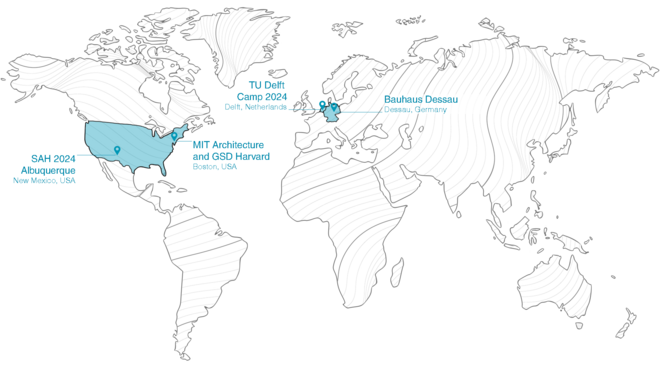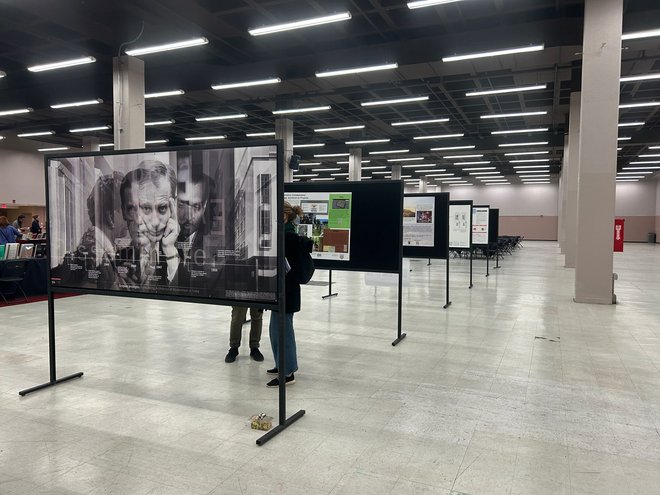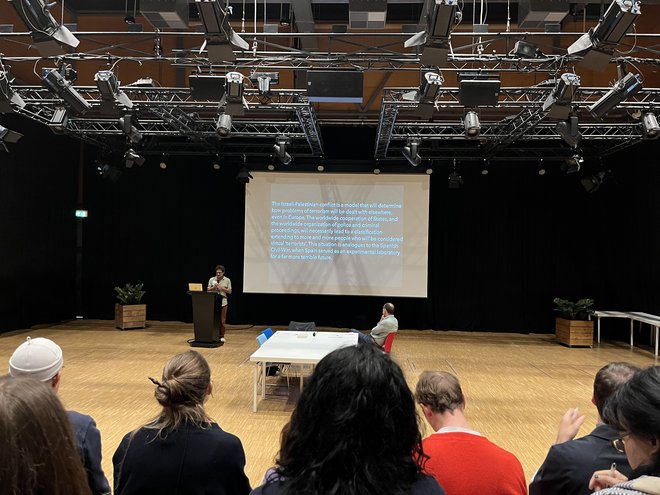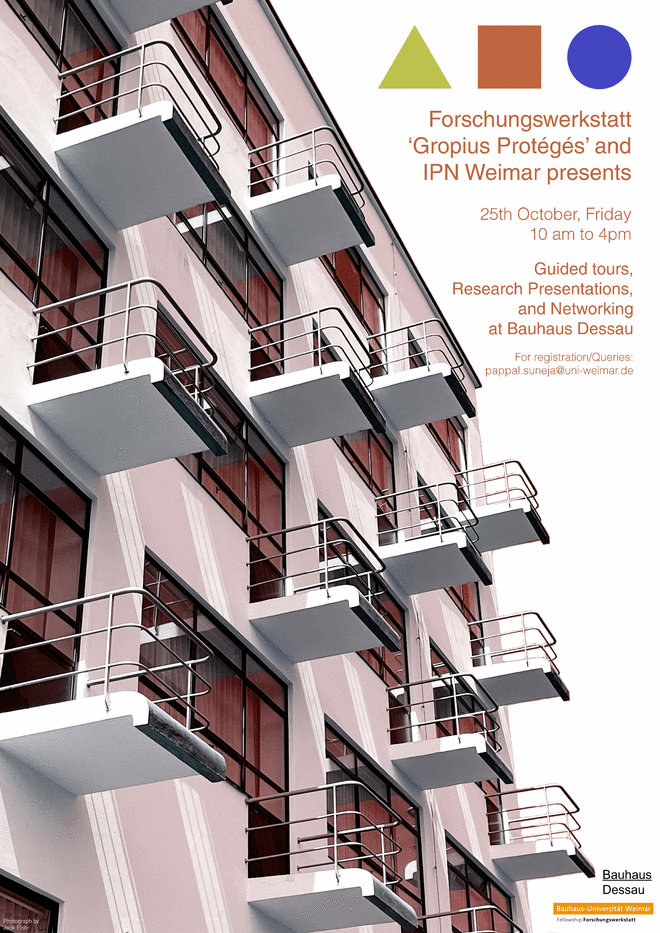

Events

SAH Albuquerque, April 2024
Sneha Singh and Marc Kratzer participated in the Society of Architectural Historians (SAH) 2024 conference in Albuquerque, presenting a poster under the "Projects in Progress" theme. Their poster, titled Gropius Protégés: Stimulating Architectural Modernism in India, was showcased in the poster exhibition. This presentation highlighted their research into the contributions of Walter Gropius' protégés to shaping modern architectural discourse in India, particularly during the post-colonial period.
Sneha attended several seminars during the conference, gaining valuable insights into diverse discourses on architectural history. One standout was Cameron Macdonell's presentation on John Evelyn and the ecological uncanny, which explored the interplay between human attempts to control nature and the sublime unpredictability of environmental forces, as exemplified by Evelyn's greenhouse design and its destruction during the 1703 Great Storm. The seminar was an intriguing reflection on integrating ecological resilience into architectural practice and especially proves noteworthy in contexts of current challenges of global climate crisis.
Marc Kratzer reflected on the conference, emphasizing the impact of a lecture about preserving cultural heritage in Ukraine amidst war. He described how a scholar introduced a photogrammetry-based program enabling individuals to collectively document cultural artifacts, from monuments to everyday items, through an app that creates high-resolution 3D models stored in a cloud. This innovative approach not only preserves Ukrainian heritage under threat but also underscores the importance of safeguarding architecture and artifacts as testaments to history. Marc noted how the presentation deepened his appreciation for the urgency of documenting cultural achievements, which can be lost unexpectedly.
The conference provided Sneha and Marc with a deeper appreciation of historical and contemporary architectural challenges, broadening her understanding of architecture as a complex negotiation between cultural, environmental, and philosophical dimensions.

Visiting Scholar at Massachusetts Institute of Technology, HTC Architecture, Sept/Oct 2024
Pappal Suneja conducted a series of seminars in 2024 while visiting Boston USA as a visiting scholar, addressing key issues in the intersections of art, architecture, and media, while exploring the complex dynamics that shaped postcolonial India’s architectural and cultural identity. On 7 October, at Harvard University’s Graduate School of Design (GSD), Suneja presented a seminar titled "Gropius Protégés and Design (1957-1988): A Modern Architectural Discourse of India." This session examined the profound influence of Design magazine and its role in shaping the architectural landscape of postcolonial India. Special attention was given to the contributions of Walter Gropius-trained architects, such as Habib Rahman and A.P. Kanvinde, who, through their work and through the pages of Design, helped define India’s modernist architectural identity by blending European modernism with India’s rich cultural traditions.
The following day, on 8 October, at MIT, Suneja launched his book "Charles Fabri: An Art Critic, Building Bridges between India and Europe," in a seminar that explored Fabri’s pivotal role in bridging Indian and European art and architectural traditions. By focusing on Fabri’s contributions as an art critic and his influence on India’s modernist movement, Suneja highlighted the cultural exchange between India and Europe that Fabri helped foster, particularly in the fields of art criticism and architectural discourse. Fabri’s work is seen as central to understanding how European modernist ideas were absorbed into the Indian context, and how these cross-cultural dialogues contributed to the shaping of India’s postcolonial artistic identity.
On 23 September, Suneja led a seminar at Boston University that addressed the evolving landscape of research methods in architectural studies. This session focused on innovative interdisciplinary approaches and methodologies used in architectural research. Suneja’s insights emphasized how contemporary architectural research draws from diverse fields such as sociology, history, and cultural studies, highlighting the importance of integrating theory with practice in the study of architecture. The seminar also provided a platform for discussing the changing nature of architectural inquiry in response to both global and local challenges.
Earlier, on 3 October, at Wellesley College of Art, Suneja presented on Art & Identity of Postcolonial India: The Case of Design (1957-1988), where he discussed how Design magazine played a central role in documenting and shaping India’s artistic and architectural identity. He explored the magazine’s influence on the discourse surrounding India’s postcolonial identity, focusing on how it bridged the gap between local artistic traditions and the global currents of modernism. Through the writings and contributions of key figures such as Charles Fabri, Walter Gropius, and leading Indian architects, Design actively participated in the creation of a new, modern Indian identity, offering a critical platform for dialogue and exchange.
These seminars, spread across prestigious institutions, served as a platform for Suneja to engage with and illuminate the transformative role of media, art, and design in shaping modern Indian identity. His work fostered significant intellectual dialogue, encouraging deeper understanding of the cultural and architectural discourses that have shaped contemporary India. Through his discussions, Suneja highlighted how design and media continue to play a central role in both reflecting and influencing the cultural and intellectual landscape of India.

Deleuze & Guattari Studies Camp, July 2024
Jorik Flohr participated in the Deleuze & Guattari Camp at TU Delft from July 3rd to 5th, 2024, focused on the theme "Intelligence, Instituting, and Archiving." The camp aimed to explore the material-discursive ecologies of these practices through interdisciplinary approaches, fostering critical and creative discussions. Alongside networking and engaging with fellow participants, Jorik also utilized this opportunity to gather relevant archival materials from the TU Delft library, contributing to the ongoing research project on Gropius’ protégés for the Forschungswerkstatt initiative.

Bauhaus Dessau Visit, Oct 2024
On October 25th, 2024, our team curated a one-day workshop at Stiftung Bauhaus Dessau, where we critically evaluated the project's goals and reviewed the existing literature to establish a clear research trajectory. This collaborative session involved young researchers and Design Research staff, alongside professors and students from Berlin International University. To further enrich the experience, Pappal Suneja, team leader of the Gropius Proteges Workshop, led a guided tour of the Stiftung Bauhaus Dessau building and the Lernot Bauhaus exhibition, connecting the project's themes with Bauhaus history and architecture.


